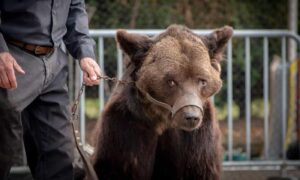Performances involving wild animals will be prohibited in two years, in legislation hailed by campaigners
The French parliament has voted to end the use of wild animals in live circus shows and outlawed mink farming, in new animal rights legislation hailed as a step forward by campaigners.
Performances of wild animals such as lions, tigers or bears will be prohibited in two years, and owning them outlawed in seven years, under the wide-ranging law passed on Thursday.
The new regulations, once signed into law by the president, Emmanuel Macron, will also ban live dolphin shows and mink farming, meaning the country’s last mink producer will close.
Macron’s centrist Republic on the Move (LREM) party called the legislation “a historic step in the animal rights combat”, while former actor and animal rights activist Brigitte Bardot welcomed “a major advance”.
Circus owners denounced it, however, while some campaigners said it did not go far enough.
As well as the measures targeting circuses, the new law will raise the maximum penalty for mistreating animals to five years in prison and a fine of 75,000 euros ($85,000), and will tighten restrictions on the sale of pets.
Loïc Dombreval, the LREM co-sponsor of the law, conceded that other controversial issues had not been included within the scope of the legislation, which won cross-party support in both houses of parliament.
“There will inevitably come a day when … we will debate sensitive issues such as hunting, such as bullfighting, or some animal-rearing practices,” said the lawmaker, who is also a veterinarian.
Several events in France in recent years have added momentum for the ban, including the death of a sickly performing bear called Mischa in 2019 that had been rescued from animal trainers, as well as the shooting of an escaped tiger in Paris in 2017.
The female tiger, named Mevy, escaped from her enclosure at the Cirque Bormann-Moreno and began roaming the streets of the French capital before being gunned down by her owner in the name of public safety.
France lags behind around 20 European countries that have either banned or heavily restricted the use of animals for entertainment. Environmentalists and more radical animal rights groups had wanted the new law to improve the conditions inside industrial animal farms.
The group L214, which had sought protections for the “more than a billion intensely farmed animals” in France, welcomed the legislation but said it “lacked courage”. The group has made a name for itself in France by sending its activists undercover into abattoirs and then publishing videos of the often shocking scenes of animals being mistreated or cut up while still alive.
Farms that make foie gras pate in France – which force feed birds such as geese and ducks to artificially bloat their livers – have also long been targeted by campaigners, but their operations will not be changed by the new law.
The 120 circus owners in France are likely to protest against the new restrictions and have warned that some animals might end up abandoned.
“It’s an arbitrary law because there are not mistreated animals in our circuses,” William Kerwich, head of the circus animal trainers’ union, told AFP.
He said there would be a reaction from his members on Monday, and a legal appeal.


